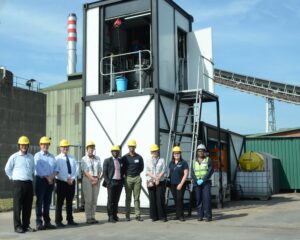Press release
WWF welcomes the formal launch of the National Water and Sanitation Master Plan by Human Settlements, Water and Sanitation Minister Lindiwe Sisulu in Pretoria yesterday as an important step towards more urgent action in the water sector.
Christine Colvin, Senior Manager: Freshwater Programmes with WWF-SA, commented: “This plan has been waiting in the wings for the last year, and now needs the urgent attention of government and partners to ensure the institutional and financial resources are available for immediate implementation.
“It highlights the urgent need to take action to secure South Africa’s water future, particularly in the light of the critical droughts being experienced in many parts of the country and further climate uncertainty.”
WWF also welcomes the frank acknowledgement by Minister Sisulu of the severe challenges facing the department. These include climate change; the slow pace of recent implementation which has left three million people without basic water services; a crippling bottle-neck at local government level; and, the need for competence building.
A critical new approach in the Master Plan is the recognition of Water Source Areas and the commitment to promulgate restrictions to destructive activities which are compromising the integrity of these critical catchments.
Colvin added, “We wholeheartedly support this along with the commitment to secure funds for restoration and the ongoing maintenance of ecological infrastructure. This will require bold new moves by government and more political muscle for the ministries of water and the environment, particularly in relation to mining.”
The Master Plan reiterates the department’s commitment to enabling the sustainable management of natural water resources and to increase the pace of delivery of water and sanitation services to all. The ambitious and far-reaching objectives of the plan are expected to require a significant step-up in resourcing, and the department itself urgently needs to reconfigure to deliver on the targets.
“We call on government to prioritise the actions required to break our Water Crisis Cycle, and focus on delivering measure to combat the five choke points that threaten our current and future water security. These include climate change; land management – and the full roll-out of the Catchment Management Agencies with concurrent influence on land-use and planning; water allocation (in particular the validation and verification exercise); addressing pollution (with the need to upgrade our existing waste-water treatment works and to deal with acid mine drainage); and urban planning where cities should urgently reduce leaks and losses and reuse more water and accelerate the “brown revolution” of low-water sanitation.”
Among the ‘green shoots’ highlighted at the launch of the Master Plan included:
- World-leading water research, facilitated by the Water Research Commission, and the need to adopt more appropriate new technologies;
- The commitment to institution building and transformation, including giving effect to Catchment Management Agencies early in 2020; and,
- The need for effective partnerships, such as the one piloted by WWF-SA in the Umzimvubu headwaters of the Eastern Cape where communities are being supported to protect springs for sustainable water supplies.
In particular, WWF is pleased that Minister Sisulu has undertaken to visit the Matatiele area of the Eastern Cape to view low-cost water alternatives for local communities as an alternative to the planned Umzimvubu Dam.
Relevant pages in Agribook.Digital include “Water“, “Wetlands” and “Invasive alien species“.



